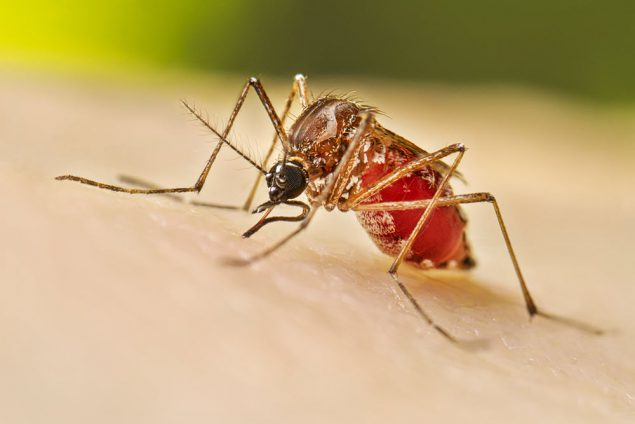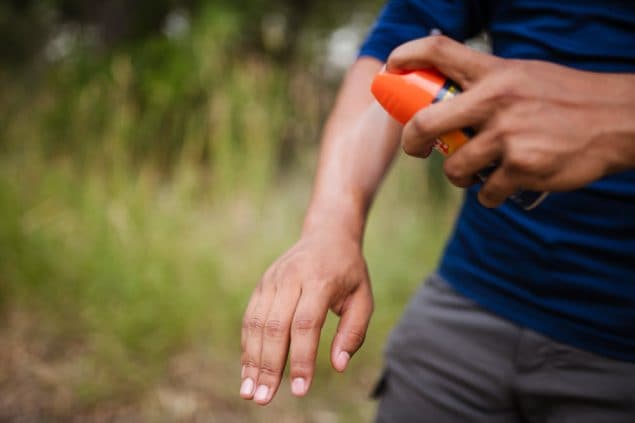Prevent Mosquito Bites

The most effective way to avoid getting sick from viruses spread by mosquitoes when at home and during travel is to prevent mosquito bites.
Mosquito bites can be more than just annoying and itchy. They can spread viruses that make you sick or, in rare cases, cause death. Although most kinds of mosquitoes are just nuisance mosquitoes, some kinds of mosquitoes in the United States and around the world spread viruses that can cause disease.
Mosquitoes bite during the day and night, live indoors and outdoors, and search for warm places as temperatures begin to drop. Some will hibernate in enclosed spaces, like garages, sheds, and under (or inside) homes to survive cold temperatures. Except for the southernmost states in North America, mosquito season starts in the summer and continues into fall.
Prevention
Examples of viruses spread by mosquitoes:

When used as directed, insect repellents are the BEST way to protect yourself and family members from getting sick from mosquito bites.
- Use insect repellent: When used as directed, Environmental Protection Agency (EPA)-registered insect repellents are proven safe and effective, even for pregnant and breastfeeding women. Use an EPA-registered insect repellent with one of the following active ingredients:
- DEET
- Picaridin
- IR3535
- Oil of lemon eucalyptus (OLE)
- Para-menthane-diol (PMD)
- 2-undecanone
- Cover up: Wear long-sleeved shirts and long pants.
- Keep mosquitoes outside: Use air conditioning, or window and door screens. If you are not able to protect yourself from mosquitoes inside your home or hotel, sleep under a mosquito bed net.
For more information, see the Mosquito Bite Prevention fact sheet. [967 KB]
Planning a trip?
Make a check list of everything you’ll need for an enjoyable vacation and use the following resources to help you prepare.
- Learn about destination-specific health risks and recommendations by visiting CDC Travelers’ Health website.
- Pack a travel health kit. Remember to pack insect repellent and use it as directed to prevent mosquito bites.
- See a healthcare provider familiar with travel medicine, ideally 4 to 6 weeks before your trip.
- Go to the Find a Clinic webpage for help in finding a travel medicine clinic near you.
Do your homework before you travel.
For most viruses spread by mosquitoes, there are no vaccines or medicines available. However, vaccines are available for viruses like Japanese encephalitis and yellow fever. Travelers to areas with risk of those viruses should get vaccinated.
After traveling
- Even if they do not feel sick, travelers should prevent mosquito bites for 3 weeks after their trip so they do not spread viruses like dengue, Zika, or chikungunya to uninfected mosquitoes.
- If you have been travelling and have symptoms including fever, headache, muscle and joint pain, and rash, see your healthcare provider immediately and be sure to share your travel history.
Mosquito-borne viruses in the continental US
West Nile virus is the most common virus spread by mosquitoes in the continental United States. People can also get sick from less common viruses spread by mosquitoes, like La Crosse encephalitis or St. Louis encephalitis. In rare cases, these can cause severe disease or even be deadly. Most people infected with these viruses do not have symptoms, or have only mild symptoms like fever, headache, nausea, and vomiting. CDC tracks diseases spread by mosquitoes.
Mosquito-borne viruses in US territories
Viruses like dengue, Zika, and chikungunya are well-known to people living in US territories like Puerto Rico and the US Virgin Islands. Many people infected with these viruses do not have symptoms, or have mild symptoms. Mild symptoms can include fever, headache, muscle and joint pain, and rash.
Almost half of the world’s population lives in areas with risk of dengue, including Puerto Rico. Dengue is caused by any one of four related viruses spread by mosquitoes. There is no medicine to treat dengue. Mild symptoms can be treated at home but severe dengue requires hospitalization. Learn more on how to avoid dengue by preventing mosquito bites. If you live in an area where dengue is common, learn more about a dengue vaccine.
Zika virus disease (Zika) is still a problem in many parts of the world. Puerto Rico and US Virgin Islands are areas with risk. Many areas in the United States have the kind of mosquitoes that can spread Zika.
Zika can cause birth defects in babies born to women who were infected during pregnancy. CDC recommends pregnant women and their partners and couples considering pregnancy know the risks and take prevention steps.
Since 2013, chikungunya virus has spread to 45 countries and over 2 million cases have been reported. US territories such as Puerto Rico and the US Virgin Islands have had large outbreaks of chikungunya virus. Infection is rarely fatal, but joint pain can often be severe and debilitating. There are also cases of travelers returning home who have been infected.